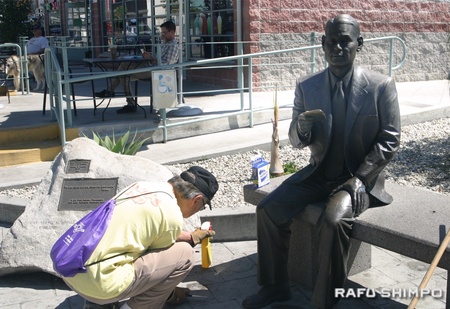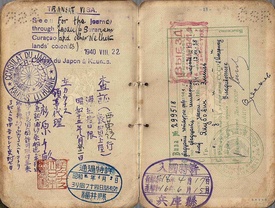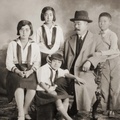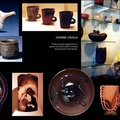I think we apply the word “hero” all too loosely, to many who may not deserve such a label. But have you ever heard of Chiune Sugihara? Perhaps not because his is not a well-known name, but I am a huge fan of Chiune Sugihara – and he is a true Japanese hero.
Sugihara was a Japanese diplomat who, during World War II, defied the direct orders of his government and chose to issue thousands of hand-written transit visas to Jews who were trying to escape the Nazi atrocities in and around the country of Lithuania.
Because of Sugihara’s actions, he saved the lives of thousands of people who made their way out of Europe and into Asia and eventually to countries where they could live their lives. Many arrived in Japan, where they stayed before they could make their way to America or other destinations.
It has been said that Sugihara, after the war, eventually returned to Japan as a disgraced government figure; he ended up doing odd jobs to provide for his family. He was a modest man who didn’t speak about his courageous acts.
One day after many years, he was surprised when some Jewish survivors finally tracked him down in order to give him their personal thanks for saving their lives. Sugihara has been recognized by Israel as one of the “Righteous Among the Nations” – the only Japanese national to be so honored. It is possible that the number of descendants saved by Sugihara could number as many as 100,000 lives!
Around 1995, I attended a play entitled Visas and Virtue, written by Tim Toyama, at the Los Angeles Museum of Tolerance. There were a couple of hundred people there; perhaps about half may have been Jewish and the other half Japanese Americans. When the powerful and moving play ended, there were tears being shed by both the Jewish and Japanese members of the audience. I believe many of the tears were a tribute in awe of Sugihara and his courage.
In 1996, a real estate developer named Shaol Levy bought the property at 2nd and Central in Little Tokyo, where he built a large store that became Office Depot. Levy was required by the Community Redevelopment Agency (CRA) to install a public art piece. Since Levy was Jewish and the art piece was to be placed in Little Tokyo, he thought it would be appropriate to honor Sugihara.
He commissioned a bronze statue of Sugihara, sitting on a bench and handing a transit visa to an unseen person. Presumably, the statue portrays Sugihara waiting to board a train to take him out of Lithuania and he was giving out life-saving visas until the very last minute – truly the pose of a hero!

This past summer, I was volunteering as usual at the Koban in Little Tokyo with some friends; we were there to help greet visitors and provide information and answer questions. An older white couple came into the Koban and asked if we could direct them to the Sugihara statue; we were quite surprised because this was a question no one had ever asked before!
I asked them why they were interested in the Sugihara statue and the lady answered, “Our family was saved by Sugihara and we want to honor him!” A big lump grew in my throat as my friends and I heartily shook their hands – what an honor to meet actual descendants, living and breathing, because a humble yet courageous Japanese man showed kindness to strangers he will never know. That is what real heroes do.
*This article was originally published in The Rafu Shimpo on January 18, 2024.
© 2024 Bill Watanabe






